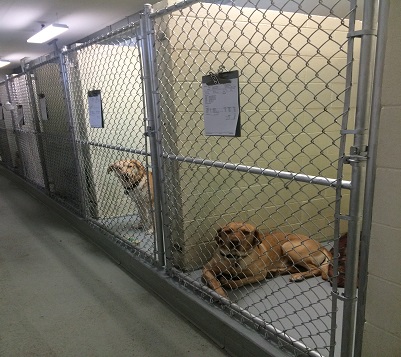When you are ready to go on vacation or you need to make an emergency trip and can’t bring your best friend, you may want to board your dog. Even those that do try to take their pet with them often run into hotel and other restrictions, especially those with large breeds. And sometimes, people let neighbors take care of their animals only to learn that the dog got out and ran away or the cat got out and got hit. Sometimes, the dog, left unsupervised for long periods of time, could injure itself.
Boarding Kennels
Over 30 million people per year board their pets at professional boarding kennels. However, before you choose a kennel, you should carefully check it out. Check online references and personal references – those you know who may have boarded at the kennel.
Using a good boarding kennel ensures that your pet stays happy and safe during your trip, and allows you to relax, knowing that your pooch is being cared for in a responsible manner. Another option to boarding kennels is a pet sitter. Depending on your needs, you may choose either, as long as a pet sitter also has the credential to properly care for your animals.
Boarding Kennel Services
A boarding kennel may simply provide a safe place for your pet to stay while you are away, or it may provide other services including training classes, shipping pets, grooming and the sale of pet supplies. Some kennels may also board other animals including exotic pets, birds, reptiles and horses. Prices may vary depending on services that are offered.
Steps to Evaluating a Boarding Kennel
Once you’ve checked references for a boarding kennel, you’ll need to take several additional steps to make sure the kennel is one you can trust with your pets, including:
- Call the kennel.
- Check to find out if the kennel has an opening for the dates you need.
- Ask about requirements, such as shots.
- Ask whether they are providing food or if you are.
- If your pet is on a special diet, ask if the kennel is willing to feed what food you bring.
- If you feed raw, make sure the kennel will feed the raw food you bring – some will not.
- If your pet is on medications, find out if the kennel will give your pet meds at the appropriate times – some will not, and sometimes, the no one is at the kennel at the time you may have to give meds.
- Check to make sure the kennel accepts your breed.
- Make an appointment to visit the kennel ahead of time.
- Check for cleanliness.
- See how the staff handles the animals.
- Make sure the staff takes proper disinfecting procedures when people enter the kennel and after each pet leaves.
- Check to see if the facilities meet your approval. Some kennels may have the dogs inside all of the time, some may have them outside all of the time. Does each kennel have a run? If not, how often does your dog get to use the run?
- Make sure each individual kennel is secure, especially if your dog is a known Houdini.
- Check to be sure that each pen/kennel is strong and that the fencing is in good condition.
- If your dog is a climber or a digger, advise the kennel and ask to see what type of precautions they will take to prevent escape.
- Make sure cats are in covered kennels.
- Make sure the kennel is safe for your pet. Anything that could harm your pet is out of reach, such as chemicals and sharp objects. If your pet is known to eat rocks or wood chips, make sure the kennel doesn’t use those items in the bottoms of the pens.
- Make sure there are solid dividers between the individual kennels.
- Exercise pens should also have dividers.
- Make sure all surfaces have good traction when they are wet.
- Make sure the kennel has firefighting equipment that is easily accessible.
- The kennel should have good supervision and all animals should be checked numerous times during the day. The person checking should be familiar with signs of distress or illness in a pet. Signs might include lethargy, bloody stools, coughing, not eating as much as your pet normally eats and not eating at all. Also, know how much your pet drinks and eliminates daily and let the boarding kennel know so they keep enough water in with your pet.
Additional items to check include making sure the staff keeps water buckets filled and clean, feeding procedures and whether the kennel has veterinary services nearby. Make sure you know what the kennel’s policy is regarding vet care. Some may have a vet treat your dog, which could cost you thousands that you might not have. If you have pet insurance, be sure to give the boarding kennel your pet’s insurance information.
Professional Pet Sitting, An alternative to Dog Boarding in a Kennel
If you don’t think that dog boarding in a kennel is for you, you could use a pet sitter. As with a boarding kennel, you should always vet a pet sitter thoroughly, especially since the sitter will be in your home. The pets benefit from sitters because of several reasons, including:
- Staying home where sights, sounds and smells are familiar;
- Having more play time;
- Following your pet’s regular exercise and diet routine;
- Eliminating the trauma of “being left” in an unfamiliar place; and
- Not being exposed to other animals that may be sick.
Even you see some benefits of having a pet sitter, including not having to rely on family or neighbors to watch your pet and knowing that your pet will be safe at home. One of the biggest benefits of having a pet sitter is that someone will be going in and out of your home several times a day, which makes your home more secure while you are on vacation. Always hire a professional pet sitter from a company like Barking Life Pet Concierge that checks its staff thoroughly.

